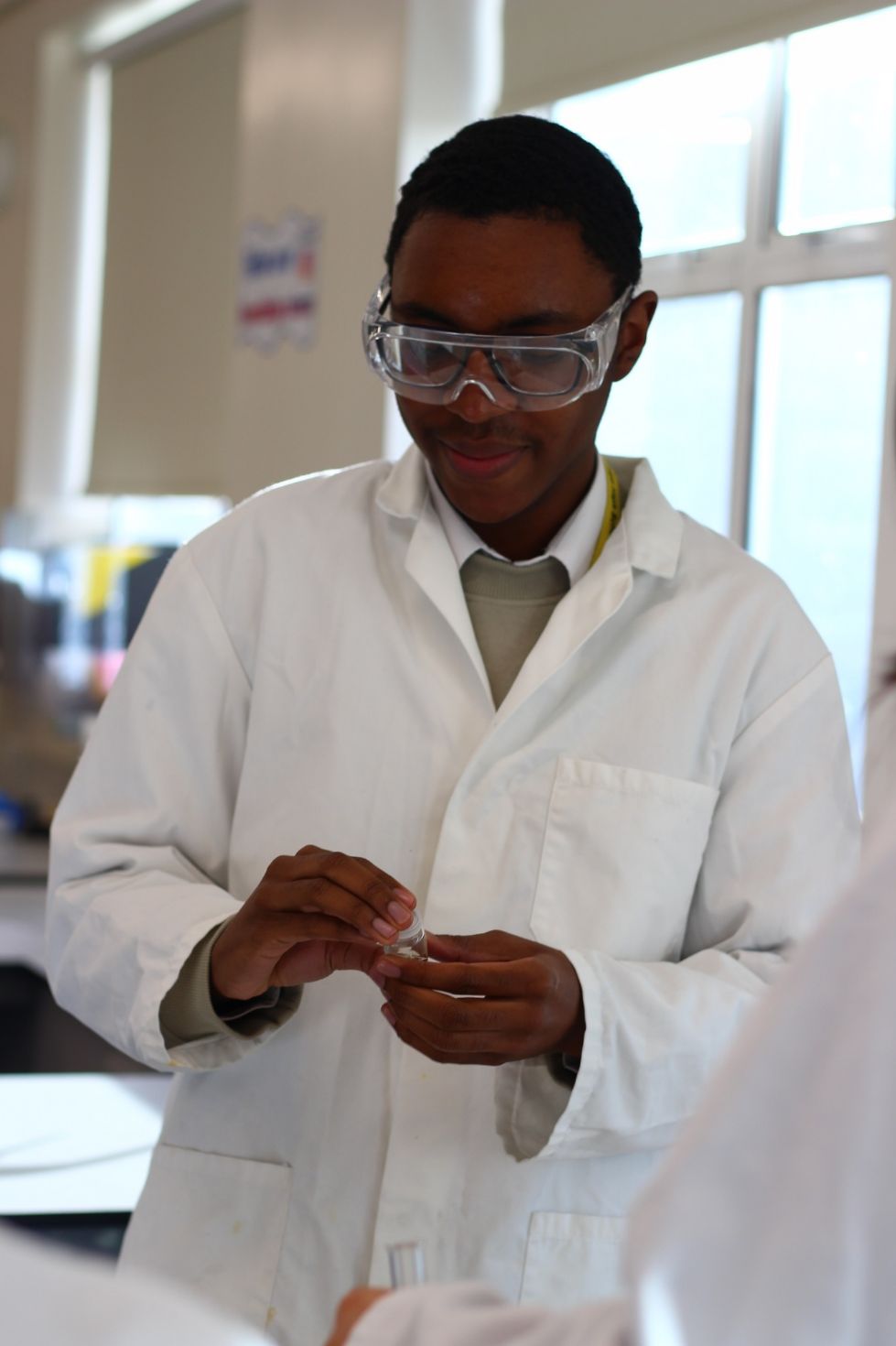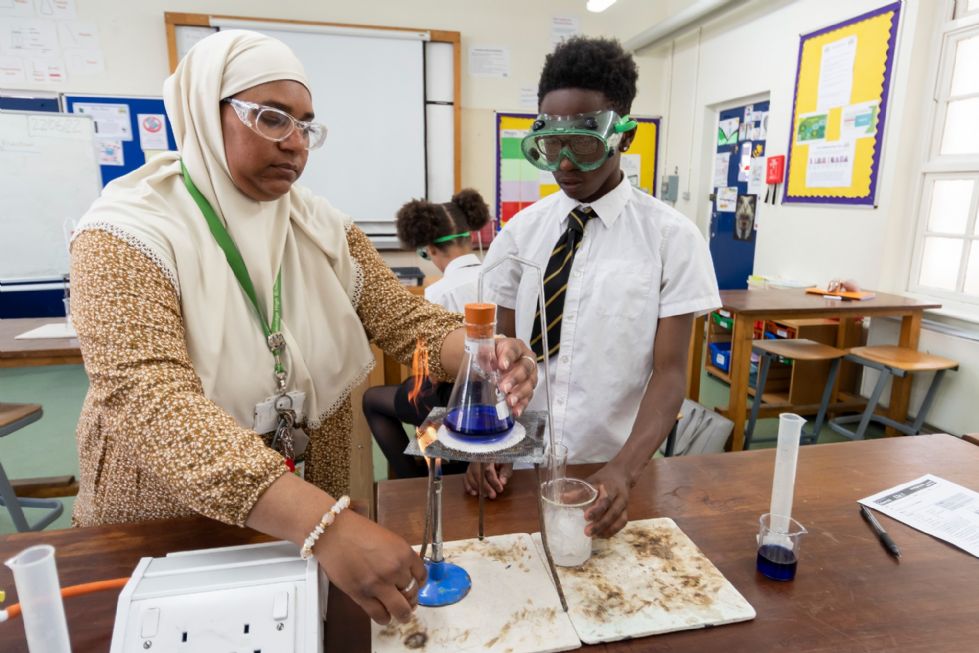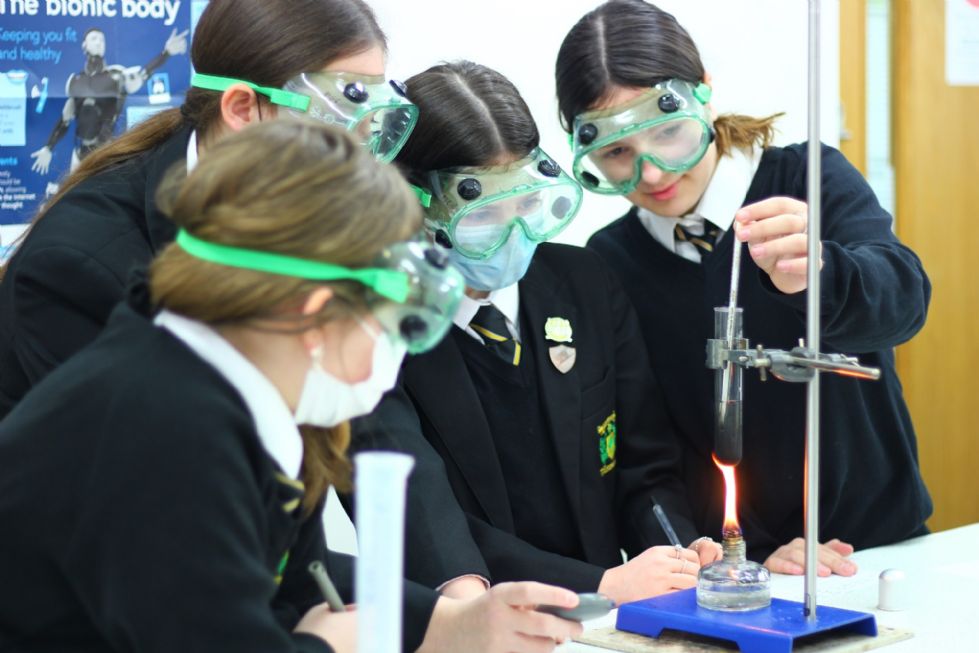Science
“We are just an advanced breed of monkeys on a minor planet of a very average star. But we can understand the Universe. That makes us something very special.”
Stephen Hawking
The aims of the Science Department
- To stimulate curiosity, interest and enjoyment of Science
- To develop a sense of wonder about our World and the Universe
- To enable students to take an informed position in matters of scientific interest and to provide the opportunity to explore ethical issues.
- To recognise the usefulness and limitations of scientific method and appreciate its applications in other disciplines as well as everyday life
- To develop abilities and skills that are relevant to the study and practice of Science and are useful in everyday life, including numeracy, communication and ICT skills
- To help students to recognise that concepts in Science are of a developing and sometime transient nature
- To stimulate and encourage students so that they are prepared to embark on the next stage of scientific study
- To encourage students to develop as independent learners and to provide opportunities for discovery in lessons
Why study Science?

To understand the world around you and your place in it, you need Science – Science is a compulsory subject, but we believe in delivering science with reference to the world around us and with as much hands-on practical experience as we can. We hope you will start to look for the underlying science in everyday things be it using Chemistry to explain the reactions that happen when you mix ingredients together to make a cake, Physics to explain how the cooker generates the heat to cook it and what the particles are doing inside it as a result and Biology to explain what happens when you eat it.
A 5-year journey through the ‘Big Ideas’ in Science
The Big Ideas in Science run through our curriculum and topics are carefully mapped into these so that students can make cognitive links from Year 7 to Year 11. Fundamental knowledge, investigative skills, mathematical skills and vocabulary are developed from Year 7 then revisited and developed over the 5 years. Fundamentals learnt at KS3 prepare students for GCSE.
| Biology | Chemistry | Physics |
|---|---|---|
| Cells and cellular processes | Materials and their properties | Energy |
| Biological systems for life | Chemical changes | Forces and fields |
| Organisms and their interactions with the environment | Our earth and it's atmosphere | Matter and materials |
KS3
KS3 covers Year 7 to Year 9. In Year 7 students are taught in mixed ability tutor groups. They will spend the first half-term developing their practical and investigative skills, including getting their Bunsen Burner licence when they are safe and competent enough to use one in the lab. They will then rotate through 7 modules of study taken from the 3 areas of science, Biology, Chemistry and Physics. The modules studied are Cells, Tissue & Organisms, Keeping Healthy, Acids & Alkalis, Particles, Reactions and Separating mixtures, Force & Speed, Energy & Electricity and Magnetism & Space. Students are assessed at the end of each topic and set appropriate targets to improve as a result. At the end of the year students sit an exam covering all the work done, and this information is used to help us group pupils as they enter into Year 8.
During Year 8 students will build on the skills and knowledge gained previously and begin to make clear links between different aspects of science. Within their practical work they will continue to develop their ability to plan, carry out, analyse and evaluate their experiments. The modules studied in Year 8 are Studying Disease, Classification & Food Webs, Life & Death, Atoms, Elements & Compounds, Sound, Light, Electricity, Energy, Forces & Space. Students are assessed at the end of each topic and set appropriate targets to improve as a result. At the end of the year students will sit an exam covering all the content from Year 7 and Year 8. Skills and knowledge learnt in Year 7 and 8 is focussed on preparing them for Year 9.
In Year 9 Students build on skills and knowledge attained at Year 7 and Year 8 and build into their knowledge how to answer questions and develop links between topics they have covered in the previous years. Within practical work students will be able to develop their planning, analysis and evaluation of experiments. Students will also develop their skills within the topics that are covered. The topics covered are; Cells & Magnification, States of Matter, Variation & Inheritance, Conservation of Energy, Atomic Structure & Periodic Table, Reactivity of Metals, Waves, Motion & Forces, Health, Separating Mixtures and Radioactivity. The Skills developed at the end of KS3 will allow students to focus and prepare for KS4.
.
KS4 – Edexcel GCSE Combined Science & Separate GCSEs in Biology, Chemistry and Physics (Edexcel)
KS4 is taught in Year 10 and Year 11, each class is taught by three subject specialists.
In Year 10, students are guided onto the GCSE pathway which suites them best at this stage of their learning. This will be either the Separate Sciences (Triple Science), Combined Science Higher or Combined Science Foundation. Both pathways build the fundamental knowledge and skills needed for A level. We accept students onto A level Sciences from both pathways.
Whichever pathway students take, they will learn Biology, Chemistry and Physics and sit 6 exams at the end of Year 11.
Combined Science is typically what the majority of students will study Nationally and there are two tiers of entry ‘Higher’ and ‘Foundation’. The Higher tier exams are more difficult and allow up to a grade 9. Foundation exams have a lower demand and allow up to a grade 5. Combined Science is worth 2 GCSEs.
The Separate Science pathway contains extra content and more complicated topics as well as having longer and more challenging exams. It is worth 3 GCSEs.
There is no coursework element within both these courses; instead students will be expected to have carried out a number of core practicals over the duration of the course which they will be asked about within the written exam papers.
KS5 – A-level Biology (Edexcel)
The Biology course is designed to give a broad and balanced understanding of both Plant and Animal Biology and the skills and techniques needed to study living organisms. The curriculum is structured to include those areas of Biology that are at the forefront of modern scientific research, including Gene Technology, Transmission and Prevention of Disease, Conservation, and Global Climate Change. Students’ are required to carry out a number of core practical’s across the 2 years of the course and these will build on the skills they developed at GCSE leading to them being able to devise, structure and carry out their own individual investigation during Year 13 which is assessed by the exam board.
KS5 – A-level Chemistry (Edexcel)
Chemistry is the science of materials. Advanced chemistry students learn about atomic and electronic structure and use these ideas to explain the chemistry of particular elements in the Periodic Table. The chemistry of carbon (organic chemistry) is studied specifically and the factors that control chemical change form the basis for a study of physical chemistry. In A2, quantitative chemistry is developed and students study organic synthesis and analysis methods in further studies of organic chemistry. Chemistry is a laboratory based subject and throughout the course practical activities are linked to the theory studied and a variety of experimental techniques are learnt.
KS5 – A-level Physics (Edexcel)
You will learn about how objects move, how mechanical systems operate, how light, waves and sub-atomic particles behave, how electric and gravitational fields affect the world around us and how Physics applications shape the world of the future. You will be expected to solve numerical problems and to describe and discuss your understanding of physical concepts. You will have the opportunity to develop your practical skills and will perform experiments that illustrate scientific theory.
KS5 – CTEC Applied Science
The Applied Science course is designed to develop professional and practical skills through carrying out real experiments and research. Students will gain an understanding of the different types of scientific industries and settings plus how laboratory design can vary. It includes elements of Biology, Chemistry and Physics as well as real life applications of the skills learnt.
This is equivalent to studying one full A-Level and is treated as equally as an A-Level in terms of UCAS points.


Future Pathways
Students who have studied Science are in high demand and an A-level in any of the Science subjects will demonstrate to employers and universities that you have developed the skills and knowledge demanded by what are regarded as some of the most academically rigorous A-levels on offer. Our past pupils have gone on to work as Doctors, nurses, engineers, computer programmers, physiotherapists, midwives, analytical chemists as well as within wider unrelated fields of law, accountancy, and managerial positions in all industries.
Applied Science can lead into a variety of career paths including laboratory technician, food development technician, conservation wardens before undertaking further study to progress onto more senior roles such as water quality expert, environmental manager, and microbiologist. Examples of employers who offer opportunities for suitably qualified individuals include: conservation organisations; the Environment Agency; water companies; waste management companies; DEFRA; food producers; pharmaceutical companies, the NHS and local authorities.
